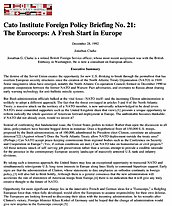But Bush administration officials balked at the vital fence–NATO itself–and the incoming Clinton administration is unlikely to adopt a different approach. The fact that the threat envisaged in articles 5 and 6 of the North Atlantic Treaty, a massive attack on the territory of a NATO member, is now universally acknowledged to be dead (even NATO’s most committed supporters such as the United Kingdom share that view),[1] presents a unique opportunity to rethink radically the whole question of American forward deployment in Europe. The unthinkable becomes thinkable: if NATO did not already exist, would we invent it?
Instead of confronting that fundamental issue, the United States prefers to tinker. Rather than open the discussion to all ideas, policymakers have become bogged down in minutiae: Does a hypothetical floor of 150,000 U.S. troops, proposed by the Bush administration, or of 100,000, adumbrated by President-elect Clinton, constitute an adequate deterrent?[2] (Against whom?) Does the North Atlantic Treaty allow NATO deployment outside the treaty area? (Perhaps.) Can NATO accept peace-keeping commissions from regional bodies such as the Conference on Security and Cooperation in Europe? (Yes, if certain conditions are met.) Can NATO take on humanitarian or civil projects? All those notions smack of self-serving job preservation rather than a serious attempt to provide a credible rationale for the presence in the contemporary European security landscape of massively armored U.S. tank and infantry divisions.
By taking such a timorous approach, the United States may lose an exceptional opportunity to transcend NATO and simultaneously reinvigorate U.S. long-term interests in Europe along lines likely to command bipartisan support. Early signs are that the administration of Clinton, whose statements to date emphasize an orthodox continuity in foreign policy,[3] will also fail to think boldly. Although there is a general consensus that the new administration will accelerate the rate of drawdown of American troops from Europe,[4] there is no indication that it will give any truly creative thought to the future of NATO.
Opportunity for more significant change lies in the innovative French and German ideas for a “Eurocorps,” a fledgling European force that, when fully developed, would allow the Europeans to assume responsibility for their own defense. The Europeans are looking forward to discussing their ideas with the incoming administration. In his remarks after Clinton’s victory, Foreign Minister Klaus Kinkel of Germany said he hoped that the change of administration would give new impetus to the Eurocorps concept.[5]

